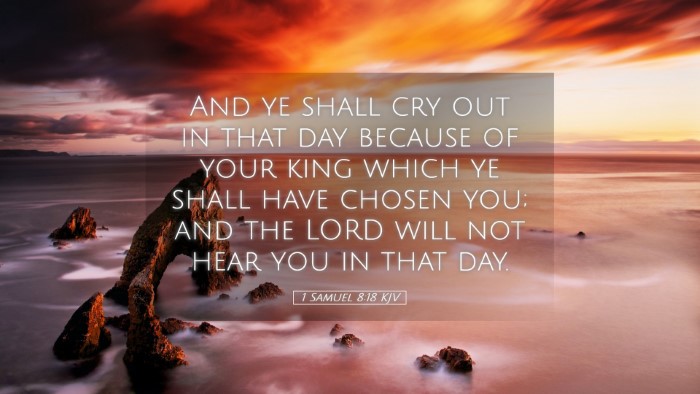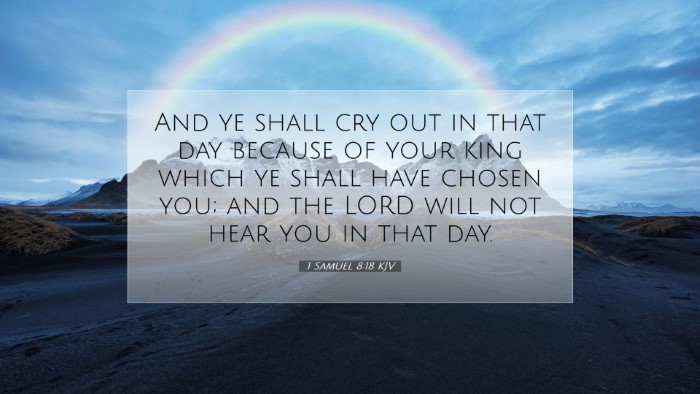Bible Commentary on 1 Samuel 8:18
Verse: 1 Samuel 8:18 - "And you will cry out in that day because of your king whom you have chosen for yourselves; but the LORD will not hear you in that day."
Introduction
This verse underscores a pivotal moment in Israel's history where the people demanded a king to rule over them like the surrounding nations. This demand was not merely a request for a leader; it was a rejection of the theocratic system God had established. The implications of this choice are profound and far-reaching, as they reflect a collective decision to forsake divine guidance.
Theological Insights
-
Rejection of Divine Authority: Matthew Henry notes that the Israelites’ desire for a king was fundamentally a rejection of God’s sovereignty. They wanted to be like other nations, forgetting that their unique identity was a gift from God. This craving for human governance over divine guidance is a recurring theme in the biblical narrative.
-
Consequences of Human Choices: Albert Barnes emphasizes that God’s warning through Samuel about the future burdens that a king would impose is significant. The people, despite foreknowledge of the hardship, still insisted on human leadership. This highlights an important lesson in discernment and the consequences that often follow poor decision-making.
-
The Silence of God: Adam Clarke points out the chilling reality that even when the people cry out in distress due to the consequences of their choices, God’s response will be silence. This illustrates the serious nature of their rebellion and the gravity of turning away from divine guidance. It serves as a somber reminder of God's justice and the ramifications of human stubbornness.
Historical Context
The request for a king arises during a time of moral and spiritual decline in Israel. The previous leaders, particularly the judges, had failed to maintain order and justice, leading the people to feel vulnerable and exposed. The historical context reveals how societal pressures can lead to drastic spiritual compromises.
Application for Today's Believers
-
The Quest for Leadership: Today's church must take heed of Israel’s mistake by understanding the balance between seeking human leadership and relying on divine guidance. While human leaders are necessary, the spiritual authority should always belong to God, as He knows what is best for His people.
-
Warning against Worldly Influence: Just as the Israelites were influenced by the nations around them, Christians today must guard against conforming to worldly standards for leadership and governance. The pressures to adopt secular models can dilute the church's mission and identity.
-
Listening to God's Voice: The warning that God would not hear their cries should serve as a powerful admonition. It calls believers to actively seek and listen for God’s voice in their lives and communities, ensuring that their choices align with His will.
Conclusion
The verse 1 Samuel 8:18 is a poignant reminder of the dangers that arise from choosing human leadership over divine guidance. It challenges contemporary believers to reflect on their own choices and the influences that shape their understanding of authority and governance. As they navigate the complexities of leadership within their communities, they are called to prioritize God’s leadership above all.
Prayer
Heavenly Father, grant us wisdom as we seek leadership in our lives. Help us to discern when we are swayed by worldly standards and remind us to depend on you for guidance, knowing that you have our best interests at heart. May our cries always be directed towards you, trusting in your mercy and grace. Amen.


